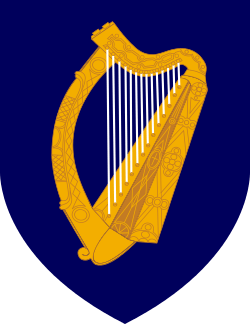Department of State (Ireland)
 |
|---|
| This article is part of a series on the politics and government of the Republic of Ireland |
|
Administrative geography |
|
|
A Department of State (Irish: Roinn Stáit) of Ireland is a department or ministry of the Government of Ireland. The head of such a department is called a Minister of the Government; prior to 1977 such ministers were called Ministers of State, a term now used for junior (non-cabinet) ministers.[1] Most members of the government are Ministers of the Government, though there may occasionally be a minister without portfolio. The law regarding the departments of state and ministers of the government is based in the Constitution of Ireland, primarily in Article 28, with legislative detail in the Ministers and Secretaries Acts 1924 to 2017.
Overview
There are seventeen individual departments of state in the Irish Government. Each department is led by a Minister of the Government, who is appointed by the President on the nomination of the Taoiseach and approval of Dáil Éireann, and cover matters that require direct political oversight. For all departments, the Minister in question is known as Minister for … and is a member of the Cabinet; a cabinet-level minister without a department is called a minister without portfolio but currently there is none of such standing. A Minister of the Government is generally supported by a team of junior ministers, officially called Ministers of State, and may delegate powers to such officials in accordance with law.
Under the terms of the Constitution, there may be no fewer than seven, and no more than fifteen members of the cabinet, though there is no restriction on individual Ministers being responsible for more than one department. At present, Paschal Donohoe is responsible for the Departments of Finance and of Public Expenditure and Reform, while Taoiseach Leo Varadkar is also the Minister at the Department of Defence.
The Minister of the Government has the power to suggest and propose new or amended legislation to the Government relating to matters that arise in their own department. Ministers are also entitled to make statutory instruments, also known as delegated or secondary legislation. Statutory instruments allow the minister to give effect to or implement legislation without the need to have every detail passed by the Oireachtas. Statutory instruments do not have to be approved by the Oireachtas, although they may be cancelled by either the Dáil or the Seanad and may not supplant the role of primary legislation.
Each department of state has a permanent staff that remains in office regardless of changes in government or the Oireachtas. The departments' staff are described as the civil service. The administrative management of the department is led by a senior civil servant known as a secretary-general. These officials advise and assist the minister in the running of the department.
List of departments of state
Current departments of state, listed under their present title.
Past Departments of state, listed under their final title
- Note: Frank Aiken served as Minister for the Co-ordination of Defensive Measures from 1939 to 1945 during the Emergency. In this capacity, he was formally a minister without portfolio as there was no corresponding Department of State.
References
Notes
External links
- Alphabetical list of orders made under section 6 (1) of the Ministers and Secretaries (Amendment) Act, 1939 (change of name and transfer of functions between Departments of State)